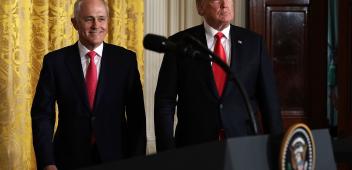Asia must brace for Greek shockwaves
Asia must brace for Greek shockwaves
Stephen Grenville
Nikkei Report
6 July 2015
Click here for the online text.

Executive Summary
Greece's referendum is over but it will take some time for the full implications to evolve. The Greek people have delivered a resounding 'No' to their international creditors, but their message is mixed: they want to end austerity measures yet stay in the euro. This option is not on offer, and the European negotiators do not have much wiggle-room to give concessions, even if they were so inclined. Whether the Greek banks reopen or remain closed, they cannot function long without support from the European Central Bank. Time is running out.
Whichever way it works out, it is bad news for Greece. Leaving the euro would be hugely disruptive and the economy would take years to recover. Staying in the euro means a continuation of the failed policy of austerity. Thus Greece is in for a hard time. But how serious is this for Asia?
Greece is tiny - less than 2% of the European Union's gross domestic product and less than 0.5% of global GDP. The country's deep-rooted problems could set off a much wider collapse in Europe, but this is unlikely. Greek national debt, amounting to nearly 243 billion euros, is almost all held by governments or international agencies, which can wear the losses without much trauma. The ECB has the ability and means to handle any financial fall-out.
Disruption in Greece will not help Europe's lacklustre recovery, but the country is just not big enough to do much harm beyond its borders . The peripheral countries of the EU -- Spain, Italy, Ireland and Portugal -- that seemed so vulnerable to contagion at the outset of the eurozone debt crisis in 2010 are on a sustained recovery path. Each of them has made enough progress to remain largely immune. The "drama queens" of financial markets will do their best to turn this into another opportunity for profit-making market volatility, but there is not enough substance here to keep that going for long. Some might see this as the beginning of the end for the euro experiment. Now that one country is on the way out, will others follow? For all its problems, the core countries of the euro have developed a synergy which has benefited them enormously, both economically and politically. With this degree of integration already achieved, the chance of it unravelling is small. Greece was always an outlier, with its history of chronic inflation and poor economic governance. It was a misfit in terms of economic maturity.
There are, of course, obvious economic lessons. Countries cannot go on running big budget deficits, overly-generous pension schemes, and large external deficits. Incompetent and sometimes corrupt governance will hobble growth and expose vulnerabilities when the economic climate is no longer benign. The core lesson is that low productivity is incompatible with rising living standards.
Joining the euro in the first place allowed Greece to ignore these realities for nearly a decade, but it was just a matter of time before the most basic of economic lessons asserted itself: "there is no such thing as a free lunch."
Asia, with its decades of widespread economic progress, already knows these universal fundamentals. So what are the special lessons for Asia?
GREEK LESSONS
First, the Greek crisis is a reminder that currency unions are hard to maintain, especially if member states differ substantially in their economics and politics. Anyone who thought that Asia was moving gradually towards currency union (or even to a wider economic union) will need to rethink this likelihood. Supply-chain production links and closer inter-Asia economic ties make the case for smoothing cross-border connectedness (for example, through the Regional Comprehensive Economic Partnership or the U.S.-led Trans-Pacific Partnership), but this does not require a common currency. We would expect to see closer coordination and co-movement between the various currencies. Even so, this would not involve the immutable lock-step of a currency union.
At first sight there might seem to be a vital lesson here for Japan: large government debt always ends badly. As a percent of GDP, Japanese debt is much larger than Greece's unsustainable debt burden. There is, however, universal agreement that Japan's debt sits within a totally different environment. It is overwhelmingly held domestically in a country with low inflation and an external surplus. Certainly, the budget needs to be brought down and the debt reduced over time, but this can be done through a feasible combination of medium-term budget reform and nominal GDP growth. The challenge, formidable as it is, is well accepted and there is no impending surprise here. Whatever concerns there might be about Japan's debt, these remain unchanged, whatever the outcome for Greece.
For students of political economy, there is a more cogent lesson: even when there is a superior policy path for crisis resolution available, politics can sometimes push events down a different path, which none of the participants wanted. When the current government was elected early this year, there was an opportunity for a fresh start. There was unanimity among the negotiators on both sides of the table that Greece should remain in the euro. There was a common recognition that Greece could not repay its government debt (even after the 2012 restructure), although the creditors were politically constrained from acknowledging this in public. There was a similar mutual recognition that the 2012 reform program was too tough and needed to be softened.
Skilful negotiators would have found a formula to put the debt issues to one side, concentrating instead on shifting the reform program away from austerity toward more growth, while at the same time making realistic medium-term progress on the structural issues such as pensions and regulation. This would have delivered an outcome all parties could have accepted: the debt would not be written off but would be restructured, with minimal payments in the immediate future.
This political-economy lesson applies universally, even in non-crisis times. Productivity-enhancing economic reform is a never-ending challenge, and countries ranging from Japan to Indonesia have lost the habit. The lament of EU President Jean-Claude Juncker that "we know what to do; we just don't know how to get re-elected after we have done it,"' applies across Asia. Politicians must look for ways to build public consensus around sustained reform, where good economics is also good politics.
Are there lessons for international governance? It may be that in the longer term the main impact on Asia will be via the damage this has done to the reputation of the IMF. The Fund should not have become involved in the first place. Greece's problems should have been treated as a matter for the EU to sort out itself, just as federated states such as the U.S. or Australia would solve such problems internally without calling on the Fund.
Dominique Strauss-Kahn, the IMF's managing director at the time the crisis began, insisted on getting the Fund involved in Greece in order to restore the Fund's waning influence - and perhaps to enhance his own political prospects back home in France. The outcome, however, has cast a shadow over the IMF's governance and competence. This crisis demonstrated that Europe is over-represented and overly influential in the Fund's decisions. Asian countries which might find themselves in trouble cannot expect this sort of support.
As well, the Fund has demonstrated once again its inability to "bail in" private sector creditors in a timely way so as to lighten the crisis-resolution burden on taxpayers. The Fund has reminded the world that it has no effective way of handling sovereign debt restructure.
On the broader reform agenda, the Fund seems to have forgotten the lessons of excessive conditionality learned in the Indonesian program of 1997-98. The IMF's detailed involvement in the budget and reforming Greek pensions seems to be on a par with its insistence that Indonesia sharply increase its fuel prices amid the tense political environment of 1998. For Greece, the Fund's insistence on competitiveness reforms is reminiscent of its ultimately disastrous requirement for Jakarta to dismantle the Indonesian clove monopoly.
Stephen Grenville, a former deputy governor and board member of the Reserve Bank of Australia, is a visiting fellow at the Lowy Institute for International Policy in Sydney and a consultant on East Asian financial issues.



